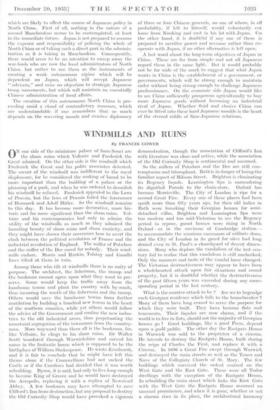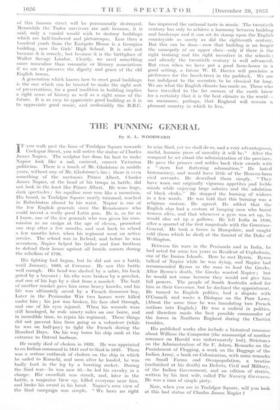WINDMILLS AND RUINS
By FRANCIS GOWER ON one side of the miniature palace of Sans-Souei are the sham ruins which Voltaire and Frederick the Great admired. On the other side is the windmill which Frederick the Great and his polite associates detested. The owner of the windmill was indifferent to the royal displeasure, for he considered the making of bread to be more important than the building of a palace or the planning of a park, and when he was ordered to demolish his windmill he refused. Frederick appealed to the Laws of Prussia, but the laws of Prussia failed the forerunner of Bismarck and Adolf Hitler. So the windmill remains to this day. It has become more decorative, more his- toric and far more significant than the sham ruins. Vol- taire and his contemporaries had only to admire the utility of the windmills as much as they admired the haunting beauty of sham ruins and sham rusticity, and they might have shown their successors how to avert the • clash between the political revolution of France and the industrial revolution of England. The miller of Potsdam and the miller of the Dee cared for nobody. Their wind- mills endure. Morris and Ruskin, Tolstoy and Gandhi have tilted at them in vain.
Among those who tilt at windmills there is no unity of purpose. The architect, the fisherman, the tramp and the bookman cannot agree upon what they want to pre- serve. Some would keep the traffic away from the handsome towns and plant the country with by-roads, thus incurring the wrath of the fisherman and the tramp. Others would save the handsome towns from further mutilation by building a hundred new towns in the heart of the southern counties, while yet others would follow the advice of the Government and confine the new indus- tries to the old industrial areas, thus perpetuating the unnatural segregation of the townsman from the country- man. More wayward than them all is the bookman, for, like Voltaire, he clings to his sham ruins. Sir Walter Scott 'wandered through Warwickshire and carved his name in the fantastic house which is supposed to be the birthplace of William Shakespeare. He wrote Kenilworth, and it is fair to conclude that he might have left this theme alone if the Cromwellians had not sacked the Castle or if the Carolinas had decided that it was worth rebuilding. Byron, it is said, had only to live long enough to become King of Greece and he would have destroyed the Acropolis, replacing it with a replica of Newstcad Abbey. A few bookmen may have attempted to save Clifford's Inn from destruction, but any proposal to destroy the Old Curiosity Shop would have provoked a vigorous demonstration, though the association of Clifford's Inn with literature was close and active, while the association of the Old Curiosity Shop is sentimental and assumed.
So the millers of Potsdam and the Dee are still con- temptuous and triumphant. Bath is in danger of losing the familiar aspect of Milsom Street. Brighton is eliminating its Regency façade. Leamington Spa is surrendering its dignified Parade to the chain-store. Oxford has become Morrisville. The City of London is ripe for a second Great Fire. Every one of these places had been spoilt more than fifty years ago, for then old ladies in Bath were forsaking their Georgian houses for semi- detached villas, Brighton and Leamington Spa were too modern and too mid-Victorian to see the Regency period in repose, gaunt houses were rising in North Oxford—as in the environs of Cambridge station— to accommodate the uxorious successors of celibate dons, and the City of London in its greed for sites had long denied even to St. Paul's a churchyard of decent dimen- sions. Many who deplore the vandalism of the last cen- tury fail to realise that this vandalism is still unchecked. Only the manners and taste of the vandal have changed. The Victorian destructiveness may appear to have been a wholehearted attack upon fair situations and sound property, but it is doubtful whether the destructiveness of the past fifteen years was exceeded during any corre- sponding period in the last century.
What is the counter-attack to be ? Are we to begrudge each Georgian residence which falls to the housebreaker ? Many of them have long ceased to serve the purpose for which they were built. They have become flats and tenements. Their façades are now shams, and if the world is to live in flats, should not the majority of Georgian houses go ? Good buildings, like a good Press, depend upon a goad public. The other day the Eastgate House in Warwick was sold to the proprietor of a cinema. He intends to destroy the Eastgate House, built during the reign of Charles the First, and replace it with a Cinema. In 1090 a Great Fire swept through Warwick and destroyed the main streets as well as the Tower and Nave of the Collegiate Church of St. Mary. The few buildings which survived the ordeal centred on the West Gate and the East Gate. These were all Tudor dwellings with the exception of the Eastgate 1-louse In rebuilding the main street which links the East Gate with the West Gate the Eastgate House assumed an unusual prominence, and when it is gone, whether or not a cinema rises in its place, the architectural harmony of this famous street will be permanently destroyed. Meanwhile the Tudor survivors are safe because, it is said, only a vandal would wish to destroy buildings which are half-timbered and picturesque. Less than a hundred yards from the Eastgate House is a Georgian building, now the Girls' High School. It is safe not because it is comely, but because it is the birthplace of Walter Savage Landon Clearly, we need something more masculine than romantic or literary associations if we are to preserve the dignity and grace of the old English towns.
A generation which knows how to erect good buildings is the one which can be trusted to make the right sort of preservations, for a good tradition in building implies a right sense of history as well as a right sense of the future. It is as easy to appreciate good building as it is to appreciate good music, and undeniably the B.B.C. has improved the national taste in music. The twentieth century has only to achieve a harmony between building and landscape and it can set its stamp upon the English countryside as surely as did the eighteenth century. But this can be done—now that building is no longer the monopoly of an upper class—only if there is the right training and the right incentive in the schools : and already the twentieth century is well advance& But even when we have put a good farm-house in a good setting, a future W. H. Davies will proclaim a preference for the beech-trees in the paddock. We are too indulgent to the eccentric to be classical for long. We are what the English climate has made us. Those who have travelled to the far corners of the earth know for a certainty that it is the best climate in the world—, an assurance, • perhaps, that England will remain a pleasant country in which to live.











































 Previous page
Previous page